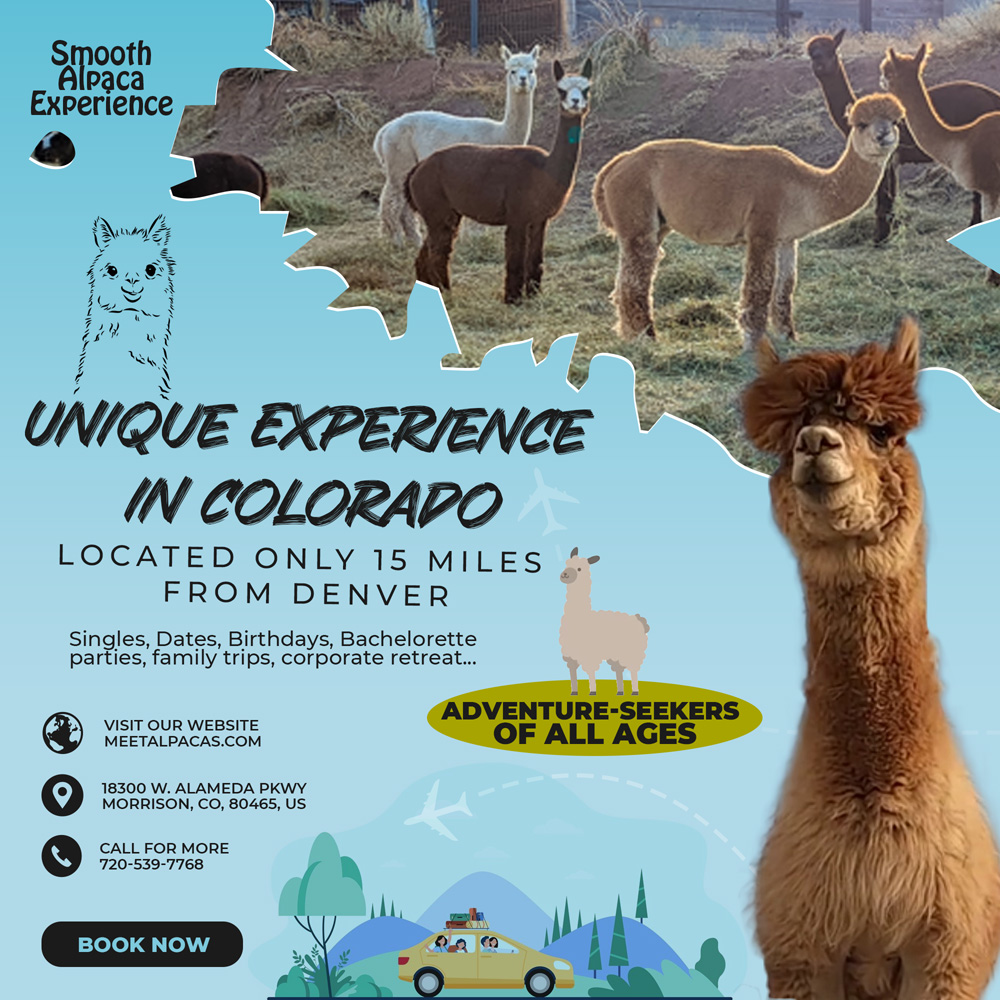Top alpaca adventure tours and vacation advices in Colorado
Colorado alpaca experiences 2024: Alpaca farms offer more than just a chance to get closer to nature; they also promote sustainable farming practices. Alpacas have less impact on the environment than other livestock, largely due to their soft feet that prevent soil compaction and erosion. Their grazing patterns also help to promote biodiversity in pastures, and their manure (nicknamed “alpaca gold”) is a great natural fertilizer. Additionally, alpacas have a longer lifespan and a high reproductive rate, making them a more stable source of revenue for farmers. Read extra info at alpaca adventures package in Colorado.

As with any type of farm, the profitability of an alpaca operation is highly dependent on a number of factors. The quality, color, and sex of the herd and the strength of the overall industry can all impact income results. It is also important for new farm owners to engage an accountant for assistance with setting up bookkeeping systems and determining tax returns. When considering buying a herd of alpacas, consider the total cost of ownership. In addition to purchasing the herd, you’ll need to invest in a barn, fencing, irrigation, and fertilizing equipment. You’ll also need to have a plan for shearing, which can be a big-ticket item and is typically held annually. Lastly, there is the labor and investment of attending shows and promoting the herd to potential buyers.
Get ready for an Alpaca Adventure ! A Wildly Immersive and Hilarious Alpaca Adventure Perfect For All Ages : Embark upon an unforgettable magical experience with affectionate Alpacas, and explore the scenic mountain views of Red Rocks Park. We offer truly unique experiences that gets you up-close with these majestic friends. You’ll be entertained and educated on their habits, diets, and life on the ranch as you discover what makes these creatures so special.
As herbivores, alpacas only eat vegetation. They eat mostly grass, but their diets can also include leaves wood, bark or stems. Like other ruminants, alpacas have a three-chambered stomach that digests the roughage efficiently. Unlike other grazers, alpacas don’t eat much. According to the Alpaca Owners Association, a 125-lb. (57 kg) animal only eats around 2 lbs. (907 grams) per day. In general, alpacas eat 1.5 percent of their body weight each day.
It’s a photo-worthy activity: If you’re looking for a fun experience where you can take some Instagram-worthy shots, meeting alpacas is for you. You’ll be able to stand with them, pet them, feed them, and take photos with and of them. Not only are you interacting with an animal you’ve likely never hung out with before, but you’re also doing it in an incredibly scenic state. Capture some photos of you smiling with an alpaca for all your followers and friends to enjoy. Are you looking for an educational opportunity for your kids? Come enjoy an alpaca experience that’s not only fun but also informative. This alpaca experience takes place on a fiber farm. This type of farm raises animals like alpacas, sheep, goats, llamas, angora rabbits, and more for their fleece and wool.
Do alpacas make noise? Alpacas are very quiet, docile animals that make a minimal amount of sound. They do make a humming sound as a means of communication or to express concern or stress. Most communication between alpacas is nonverbal. Occasionally you will hear a shrill “alarm call,” which usually means they have spotted something of concern nearby, and they are warning others in the herd. The concern may be a predator, or may be something they are not familiar with, like a cow or horse in a neighboring field. Male alpacas also “serenade” females during breeding with a guttural, throaty sound called “orgling.” See extra information at https://meetalpacas.com/.
As with all livestock, owners and visitors should use common sense and a degree of caution when working around alpacas. People working with alpacas should wear long pants and shoes or boots that have traction and cover the whole foot. Proper handling of alpacas, as well as all camelids, requires humans gaining their trust by using a calm voice and light restraint. Handling alpacas for herd husbandry is best taught to novice alpaca owners by experienced owners or experts.
Are alpacas easy to train? Alpacas are very smart animals and are fairly easy to train. It is best to start training them when they are young so that they will accept a halter and learn to follow on a lead. Many owners also enjoy training them to walk through obstacles. Some even compete with their alpacas at shows where they walk over, through, and around objects and also jump over small hurdles. Also, it is helpful to train alpacas to ride in a trailer or van if they ever need to be transported to a show or another farm. Alpacas are easy to transport, as they normally cush (lay down with their legs folded under them) when traveling. Be aware that alpacas should not be tied up when traveling.
Alpacas are very social creatures. They are gentle and curious and with training can become great pets, according to Switzer. Herds often include animals of different species or taxonomic families, such as llamas, goats and sheep, according to the FAO. Alpacas spit when they are distressed or feel threatened. They will sometimes spit at each other when they are competing for food or trying to establish dominance, according to Switzer. They won’t spit at people or bite unless they have been abused.